|
|
|
Sort Order |
|
|
|
Items / Page
|
|
|
|
|
|
|
| Srl | Item |
| 1 |
ID:
139995


|
|
|
|
|
| Summary/Abstract |
During the quarter century before the First World War, anarchist terrorism was often blamed on the impact of anarchist agitators on naïve immigrants. This article seeks to investigate the truth of this claim, focusing particularly on Italian emigrants, but also looking at some examples of Spanish, French, and Russian emigrants. My conclusion is that, with a few exceptions, radicals emigrated, but emigration did not create radical terrorists. A particularly good example of this can be found by examining the large Italian emigration to Argentina. At most, the emigrant experience may have heightened a pre-existing radicalism or given more precise configuration to its violent expression.
|
|
|
|
|
|
|
|
|
|
|
|
|
|
|
|
| 2 |
ID:
140001
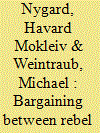

|
|
|
|
|
| Summary/Abstract |
Although military cooperation among rebel groups in multi-party civil wars could help rebels defeat or extract concessions from an incumbent government, violent conflict among rebel groups is empirically prevalent. Why do rebel groups in multi-party civil wars choose to fight one another? This article models the strategic dilemma facing rebel groups in multi-party civil wars as an alternating-offer bargaining game of incomplete information with an outside option. The game-theoretic model explores the relationship between the status quo distribution of power among rebel groups, the costs of fighting, and the likelihood that one rebel group will opt to unilaterally end bargaining over a set of goods, such as access to supply routes, natural resources, and control over civilian populations. We show that the likelihood of violent conflict between rebel groups is lowest when the status quo distribution of benefits reflects the existing distribution of power.
|
|
|
|
|
|
|
|
|
|
|
|
|
|
|
|
| 3 |
ID:
139999
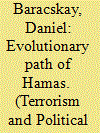

|
|
|
|
|
| Summary/Abstract |
Of the two major Palestinian factions, Hamas has demonstrated that it is more radical and willing to use acts of terrorism than Fatah. While some arguments have made the case that Hamas has become more moderate in light of efforts to develop stable institutions of government and societal organizations, there has not been conclusive evidence of this ideological shift. In fact, the continued adherence to the Muqawama (resistance) Doctrine represents a decisive facet of the movement's enduring pledge to nullify the state of Israel through a prolonged war of attrition. This article examines the role of political pragmatism in the evolution of Hamas. First, it discusses why the moderation argument alone does not provide an adequate understanding of the movement's evolution, especially since it continues to embrace the use of terrorism and violence as facets of Islamism and as an extension of the Muqawama Doctrine. Second, rather than solely using the moderation argument, this article offers an alternative approach which considers how the combination of strategic policy approaches implemented by Hamas has reflected the role of pragmatism in pursuing its domestic and foreign policy agendas, which are intertwined with the values of the Muqawama Doctrine.
|
|
|
|
|
|
|
|
|
|
|
|
|
|
|
|
| 4 |
ID:
139992
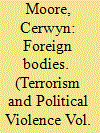

|
|
|
|
|
| Summary/Abstract |
This article examines foreign fighters and the insurgency in the North Caucasus. The first part of the article addresses conceptual issues concerning the ways that foreign fighters are analysed, posing this more widely in terms of transnational activism. Here I examine the importance of kin and relatedness. I develop this argument in the second part of the article, which examines pan-Islamism and transnational activism in the post-Soviet period. The third section draws attention to the different groups of foreign fighters, as part of a wider activist movement in the North Caucasus. Here I show that a complex group of transnational activists from the Greater Middle East, North Africa, parts of Europe, and Central Asia participated in the conflicts in the North Caucasus. Finally, the article turns to examine volunteers from the North Caucasus who travelled to fight in Syria, concluding with some considerations about the reintegration of returnees and former activists.
|
|
|
|
|
|
|
|
|
|
|
|
|
|
|
|
| 5 |
ID:
139996
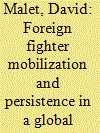

|
|
|
|
|
| Summary/Abstract |
Although foreign fighting is hardly new, scholarly research on the phenomenon is only a decade old. Since 2005, there has also been a dramatic rise in the number of transnational insurgents fighting in the Middle East, and they appear to have become the face of the jihad movement. However, of the dozens of foreign fighter contingents around the world in recent decades, only about half have been Islamists. In this article, I contend that the difference between the other contemporary and historical foreign fighter groups and the jihadis is not one of mobilization or effectiveness, but of persistence. Most other foreign fighters demobilized at the end of their conflicts and reintegrated. I argue that the primary factor that accounts for the persistence of the jihadis was the policies of their home and host states that prevented reintegration and created cohorts of stateless, and now professionalized, actors who perpetuate in weakly-governed conflict zones. In presenting this argument, I first attempt to establish a common working definition of foreign fighter based on the first decade of discourse in this emerging field of study, and present a comparative examination of the largest recorded foreign fighter mobilizations.
|
|
|
|
|
|
|
|
|
|
|
|
|
|
|
|
| 6 |
ID:
140000
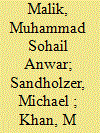

|
|
|
|
|
| Summary/Abstract |
Terrorism is a complex issue and various researchers have identified numerous causes and conditions that generate or are capable of generating terrorism. In the last decade, terrorist attacks claimed 36,495 lives and injured 27,985 people in Pakistan as a result of 3,482 bomb blasts and 281 suicide attacks. The aim of this research was to establish the major risk factors generating terrorism, based on the opinions of security officials who dealt directly with the Pakistan security situation. Sixty-five causes identified from the literature and interviews with security officials were modeled and transformed into a questionnaire. A nationwide response from security officials who were directly involved in dealing with apprehended terrorists was obtained. The population was selected proportionately from high, medium, and low security zones of Pakistan. Out of 500 questionnaires sent, 103 valid responses were received. The results helped establish the 13 major risk factors associated with generating terrorism. It was observed that addressing these 13 major risk factors would mostly resolve the other minor risk factors as well. Findings of this research might be beneficial for countries affected by terrorism, and countries with prioritized and rationalized allocation of funds in their budgets for substantially overcoming terrorism.
|
|
|
|
|
|
|
|
|
|
|
|
|
|
|
|
| 7 |
ID:
139998
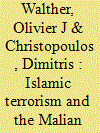

|
|
|
|
|
| Summary/Abstract |
Using Social Network Analysis, this article illuminates the relationship between the Islamists and rebels involved in the Malian conflict. We use publicly available data to demonstrate that the connection between Islamists and rebels depends on brokers who defected from the Tuareg rebellion to radical groups. Our work also details the internal relationships within each of the subgroups. By using descriptive network analysis, we are able to show that both groups were affected by the accidental disappearance of one of the Al-Qaeda in the Islamic Maghreb emirs, and the death of one of the architects of the Tuareg rebellion. Both events affected social cohesion. The article concludes with a discussion of the influence that the French-backed intervention may have on the evolution of the conflict, and how network analysis could contribute to a better understanding of terrorist activities in the region.
|
|
|
|
|
|
|
|
|
|
|
|
|
|
|
|
| 8 |
ID:
139997
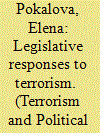

|
|
|
|
|
| Summary/Abstract |
Recent years have witnessed a significant increase in the amount of counterterrorism legislation worldwide. The commonly held assumption behind the adoption of counterterrorism legislation links it to the terrorist threat in a state. However, little research has focused on empirically testing reasons driving states to legislate. This article addresses this void by analyzing the puzzle of why states choose to adopt new terrorism-specific legislation. The article presents empirical analysis of the probability of states to legislate before and after September 11, 2001, and is based on a new database of counterterrorism legislation. The findings reveal that before September 11, state decisions to adopt new legislation correlated with the number of terrorist organizations operating in their territory. Since September 11, however, the most significant predictors for the adoption of new legislation have become the existence of previous counterterrorism legislation and the participation of a state in the War on Terror.
|
|
|
|
|
|
|
|
|
|
|
|
|
|
|
|
| 9 |
ID:
139994


|
|
|
|
|
| Summary/Abstract |
This article describes the development of foreign fighters’ preparatory modes of operation between 2000 and 2013, based on an analysis of 17 closed police investigations and 21 semi-structured interviews with police investigators, public prosecutors, and lawyers. Through the use of grounded theory methods and a crime script analysis, we find that the phenomenon is not as new as is often portrayed. It changes over time as changing opportunity structures have an impact on the activities foreign fighters undertake during the preparation phase. We demonstrate how geopolitical changes, social opportunity structures, and technological developments affect the modus operandi over time. One of the implications of our findings is that the dynamic nature of the foreign fighting phenomenon requires flexible and tailored prevention measures.
|
|
|
|
|
|
|
|
|
|
|
|
|
|
|
|
|
|
|
|
|